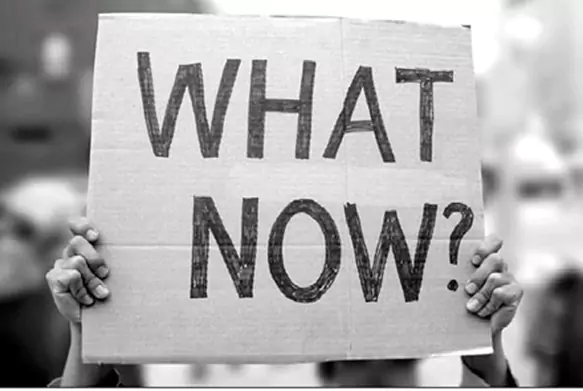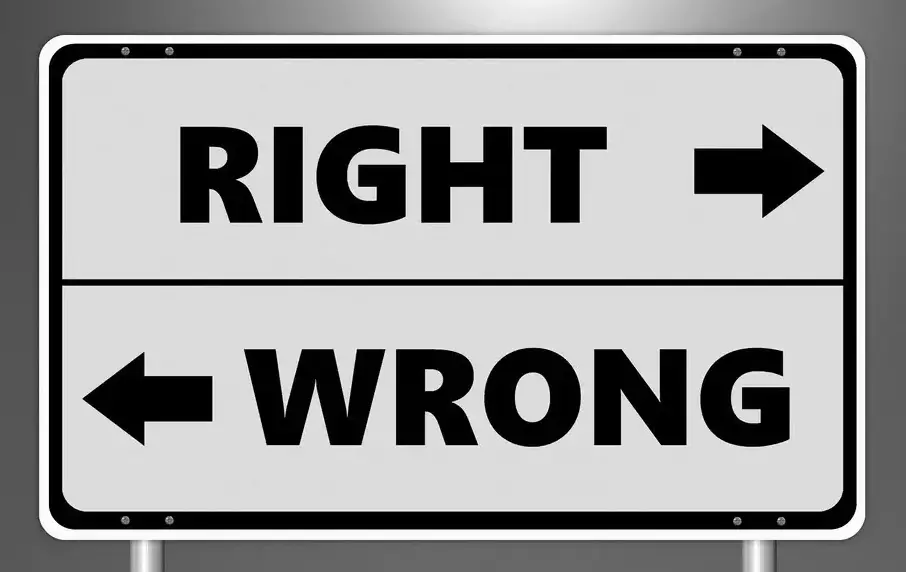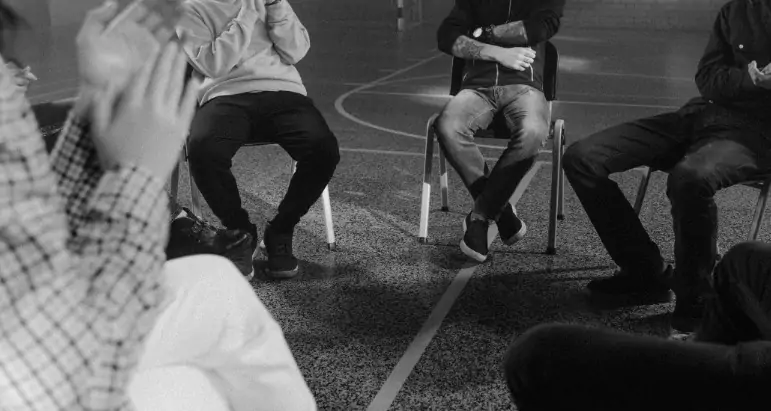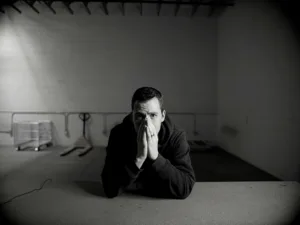Do you feel more anxiety than peace from religious experience?
Does your doubt about religion stem from fear rather than curiosity?
These emotions suggest you’re likely dealing with religious trauma. In fact, around one-third (27‒33%) of adults in the US have experienced religious trauma at some point in their life.
Unfortunately, mental health services have often failed to provide male-friendly therapy that addresses these unique needs, leaving many men without the support they require.
This trauma can cause deep emotional distress.
It is particularly challenging for some men due to the added societal expectations to suppress their emotions and always appear strong.
In addition, men often do not have welcoming, male-friendly spaces to heal from their trauma. This combination often leaves men with few options to treat their trauma symptoms which may cause their symptoms to become worse.
While doubt is a natural part of any faith journey, religious trauma differs significantly. It’s rooted in negative experiences that disrupt your emotional well-being.
This blog delves into the distinct signs of religious trauma to help you identify and address these issues.
What Is Religious Trauma
Religious trauma refers to the negative mental health consequences that occur within a religious context. It can result from harmful teachings, practices, or experiences imposed by those in authority within a religious institution.
Many people confuse religious trauma with spiritual trauma, as both involve profound struggles with faith and purpose. However, spiritual trauma can occur outside of a formal religious context. This could happen after a personal tragedy, feeling betrayed by a religious community due to misconduct, or facing existential crises that challenge the purpose of life and personal beliefs.
Both religious and spiritual trauma can significantly impact mental, emotional, and physical well-being. In the next section, we’ll examine specific signs of religious trauma.
12 Signs of Religious Trauma in Men
Religious trauma uniquely affects men, often manifesting in subtle yet profound ways. Recognizing these 12 signs can help identify and address the impact of religious trauma on men’s well-being
Sign 1: Experiencing Guilt and Shame

Have you ever found yourself asking questions like, “Am I good enough?” or “Will I ever be forgiven for my mistakes?”
Religious trauma often arises from teachings that emphasize strict moral codes. Men may feel that they have failed to live up to the expectations, leading to intense self-criticism and persistent feelings of unworthiness. It is one of the most common emotional signs of religious trauma.
Sign 2: Struggling With Anxiety and Fear

If you constantly worry about aligning your actions with your religious beliefs, your anxiety might be stemming from strict religious teachings.
The fears of divine punishment, afterlife, or judgment by others within the religious community can have a pervasive sense of dread that can prevent you from living authentically.
Sign 3: Harboring Anger and Resentment

Feelings of anger and resentment towards religious leaders or practitioners are another indicator of religious trauma in men. These emotions often originate from experiences of manipulation, betrayal, or hypocrisy within religious institutions.
Men who have been hurt by these experiences may develop deep-seated resentment towards religious institutions, leaders, or even the concept of religion itself.
Sign 4: Feeling Depressed and Hopeless

Depression and hopelessness often result from the realization that one’s religious beliefs no longer align with their ethical standards, leading to feelings of disillusionment and loss of faith.
The emotional fallout from these realizations can be devastating, making it essential to seek help, like reaching out to a therapist, and address these feelings to rebuild a sense of hope and purpose.

If you are experiencing any of these signs of religious trauma, know that you are not alone.
Dr. Jason Whitehead (MDIV, LCSW, PhD) at Denver Men’s Therapy offers professional help to guide you through the healing process.
Sign 5: Having Difficulty Forming Healthy Relationships

Are you feeling conflicted about gender identity or sexual orientation?
Many men internalize negative views of sexuality from religious teachings, leading to feelings of isolation and being misunderstood. This is especially true for LGBTQ+ individuals. They may face additional layers of shame and conflict due to religious condemnations of their sexual orientation or gender identity.
The trauma from such experiences can result in severe emotional distress, difficulties in accepting one’s identity, and strained relationships with religious family members and communities.
Sign 6: Engaging in Self-Destructive Behaviors

Men may engage in harmful actions driven by the fear of not doing enough. They may try to overcompensate through excessive religious devotion, only to feel more hollow and disconnected.
These behaviors, often attempts to regain control, can lead to burnout and deeper emotional pain.
Sign 7: Practicing Isolation and Withdrawal

Isolation or withdrawal from social interactions is a commonly practiced protective mechanism to avoid further pain and distress associated with religious trauma.
Teachings or experiences that cause emotional harm can lead to a deep sense of mistrust and raise the need to create distance from anything that triggers these feelings. This withdrawal, however, can remove important support systems, affecting social relationships and hindering the healing process.
Sign 8: Questioning One’s Faith or Spirituality

Religious trauma can arise from teachings or experiences that clash with personal values. As the individual struggles to reconcile their past beliefs with their current understanding, it results in a deep sense of betrayal and confusion
This questioning of faith can be mentally exhausting and cause an identity crisis as individuals struggle to reconcile their past beliefs with their current understanding.
However, these questions are a natural part of the healing process.
It’s a journey that requires patience and self-compassion, often guided by a supportive therapist who can help you explore and understand your evolving spiritual path.

At Denver Men’s Therapy, we offer a safe space for men to overcome religious trauma.
Reach out today to reclaim your emotional well-being.
Sign 9: Struggling to Make Decisions

Do you get worried about the moral implications of your decisions?
The fear of making the wrong choice paralyzes an individual’s decision-making ability. This is often a result of rigid religious teachings that discourage independent thinking. This internal struggle can affect various aspects of life, from personal relationships to career decisions.
Sign 10: Adopting Black-and-White Thinking

Authoritarian and dogmatic religious teachings frequently promote strict dichotomies, such as good versus evil or right versus wrong, leaving little room for nuance and personal interpretation.
Individuals might find themselves categorizing experiences and people as entirely good or entirely bad. This all-or-nothing thinking is a defense mechanism that provides a false sense of control and security during traumatic times but can become maladaptive as an adult.
Such extreme thinking can cause conflict in relationships and hinder personal development. It makes therapy even more necessary to explore and accept life’s gray areas.
Sign 11: Encountering Intrusive Thoughts or Flashbacks

Religious trauma can cause the brain to encode memories in a fragmented way, leading to intrusive thoughts that are often just parts of the original trauma. This happens because the trauma overwhelms the brain’s normal processing mechanisms, leaving these fragments unprocessed and prone to intrude into the present.
Therapeutic techniques like EMDR can be highly effective in processing and alleviating these distressing symptoms by helping to integrate these fragmented memories.
Sign 12: Struggling to Find Meaning Outside Religion

Religious trauma can shatter the sense of purpose that was once tied to your faith, leaving you feeling lost and directionless.
When religious teachings and community are deeply embedded in one’s identity, losing that foundation can lead to an existential crisis. This struggle typically develops from being raised in a religious environment where your sense of identity and purpose is closely linked to your beliefs.
Therapy provides the support needed to explore new paths, develop personal values independent of religious dogma, and build a fulfilling life.
Examples of Religious Trauma and Abuse

Understanding the types of religious trauma and abuse through examples can help you resonate with your own experiences, recognizing the profound impact they may have on your life.
1. Sexual Abuse by Clergy or Religious Leaders
Instances of sexual abuse by clergy or religious leaders have profoundly impacted many individuals worldwide.
In the United States alone, more than 5,300 priests and other members of the clergy have been accused of sexual abuse.
The Catholic Church’s sex abuse crisis has also been reported in other countries.
A study conducted in Germany found that 4.4% of its overall clergy had been accused of the sexual abuse of minors. The victims were predominantly male (62.8%) and children under the age of 14 (66.7%). In 80% of cases, the sexual abuse involved bodily contact.
Another study of French Catholic priests found systemic sexual abuse that had been carried out by almost 3,000 priests and members of the clergy since 1950.
The estimated number of victims identified in the French Catholic Church was an astonishing 216,000 people. Around 80% of the victims were boys.
Survivors of such abuse often endure long-term psychological trauma stemming from the betrayal of trust and misuse of authority by those in positions of power.
It potentially causes deep emotional scars, including severe anxiety, depression, and difficulties in forming healthy relationships. Feelings of shame and guilt are common, exacerbated by the religious context of the abuse.
2. Emotional and Psychological Abuse by Religious Authorities
Verbal abuse, shaming, and emotional manipulation by religious leaders or community members can result in deep emotional wounds. It includes feelings of worthlessness and inadequacy in survivors. This abuse can erode the individual’s trust in others, leading to social withdrawal and difficulties in forming and maintaining healthy relationships.
3. Harsh, Judgmental Teachings
Exposure to strict religious doctrines that condemn natural human behaviors or identities can lead to internalizing negative messages, resulting in intense guilt and self-loathing. This can manifest as chronic low self-esteem, depression, and anxiety.
For LGBTQ+ individuals, such teachings can cause deep conflicts with their identity, leading to severe emotional distress and isolation.

Our expert therapist Justin Friel, LMFT specializes in supporting LGBTQ+ men with religious trauma.
4. Psychological Manipulation Through Fear-Based Teachings
Constant exposure to teachings about eternal damnation or divine punishment can instill a pervasive sense of dread and anxiety. Men may develop a paralyzing fear of divine retribution, hindering their ability to make decisions, pursue personal goals, or live authentically. This constant state of fear can also contribute to chronic stress and related physical health issues.
5. Forced Participation in Religious Practices
Men may experience significant internal conflict as their actions are at odds with their personal values. This can result in emotional numbness, disconnection from one’s sense of self, and difficulties asserting personal boundaries in other areas of life.
Therapeutic Approaches to Heal From Religious Trauma for Men

Healing from religious trauma is a deeply personal and transformative journey. It requires courage, vulnerability, and support. The right therapist can provide a safe, non-judgmental space for you to explore your experiences and feelings.
Here are some therapeutic approaches that can help men:
- Eye Movement Desensitization and Reprocessing (EMDR): This helps desensitize the emotional response associated with traumatic memories, making them less overwhelming. It is particularly useful for processing and integrating fragmented memories of religious trauma, helping individuals shift towards a more positive self-perception. Learn more about EMDR therapy here.
- Group Therapy and Support Groups: Group therapy offers a platform to share your story, listen to others, and gain new perspectives. Realizing that you are not alone in your journey can be incredibly healing. Support groups provide a sense of community and validation, which is essential for recovery from religious trauma. Explore more group therapy options.
- Therapy for LGBTQ+ Individuals: Therapy can help address issues of internalized shame, homophobia, and the specific impacts of religious teachings on their sexual orientation or gender identity. Tailored support helps LGBTQ+ individuals face their unique challenges and heal from the additional layers of trauma.
- Cognitive-Behavioral Therapy (CBT): This is a highly effective approach for addressing the negative thought patterns and beliefs that often accompany religious trauma. This approach helps reframe harmful beliefs and develop healthier, more adaptive ways of thinking.
Moving Forward on Your Path to Healing

Recognizing the signs of religious trauma is the first step in the healing process.
At Denver Men’s Therapy, we understand the unique challenges that men face when confronting religious trauma. Our compassionate and knowledgeable therapists provide a safe and non-judgmental space for you to process your experiences, explore your beliefs, and develop new coping strategies.
If you’re ready to take the first step towards healing and reclaiming your life, we invite you to contact us today.
Remember, your healing and well-being are worth prioritizing, and we’re here to help you every step of the way.
Frequently Asked Questions
1. Can religion cause mental health issues?
Yes, rigid, abusive, or fear-based religious teachings can contribute to mental health issues like anxiety, depression, and PTSD.
2. How long does religious trauma last?
The duration of religious trauma varies; it can last for years, decades, or even a lifetime if not addressed through therapy and support.
3. Can religious trauma lead to PTSD?
Yes, religious trauma can lead to PTSD, especially in cases of severe abuse or prolonged exposure to fear-inducing teachings
4. How can childhood religious experiences lead to trauma?
Childhood religious experiences can leave lasting emotional scars through indoctrination, abuse, fear-based teachings, and coercive practices. These lead to trauma.
5. Is it possible to repair relationships with parents after experiencing religious trauma?
Yes, it is possible to repair relationships with parents through open communication, therapy, and mutual understanding of the trauma’s impact.
6. How should Christians respond to religious trauma?
Religious trauma can be a confusing and isolating experience for Christians. Here are some paths to consider for healing:
- Seek professional support
- Talk openly with trusted individuals.
- Find supportive faith-based communities
7. What resources are available for men experiencing religious trauma?
For men experiencing religious trauma, Denver Men’s Therapy provides a variety of resources and services, including individual therapy, support groups, EMDR therapy, and specialized counseling services. You can learn more about these resources in our blogs.
8. When should I seek help for religious trauma
If trauma impacts daily life, affects relationships, or causes overwhelming emotions, you must seek professional help.














